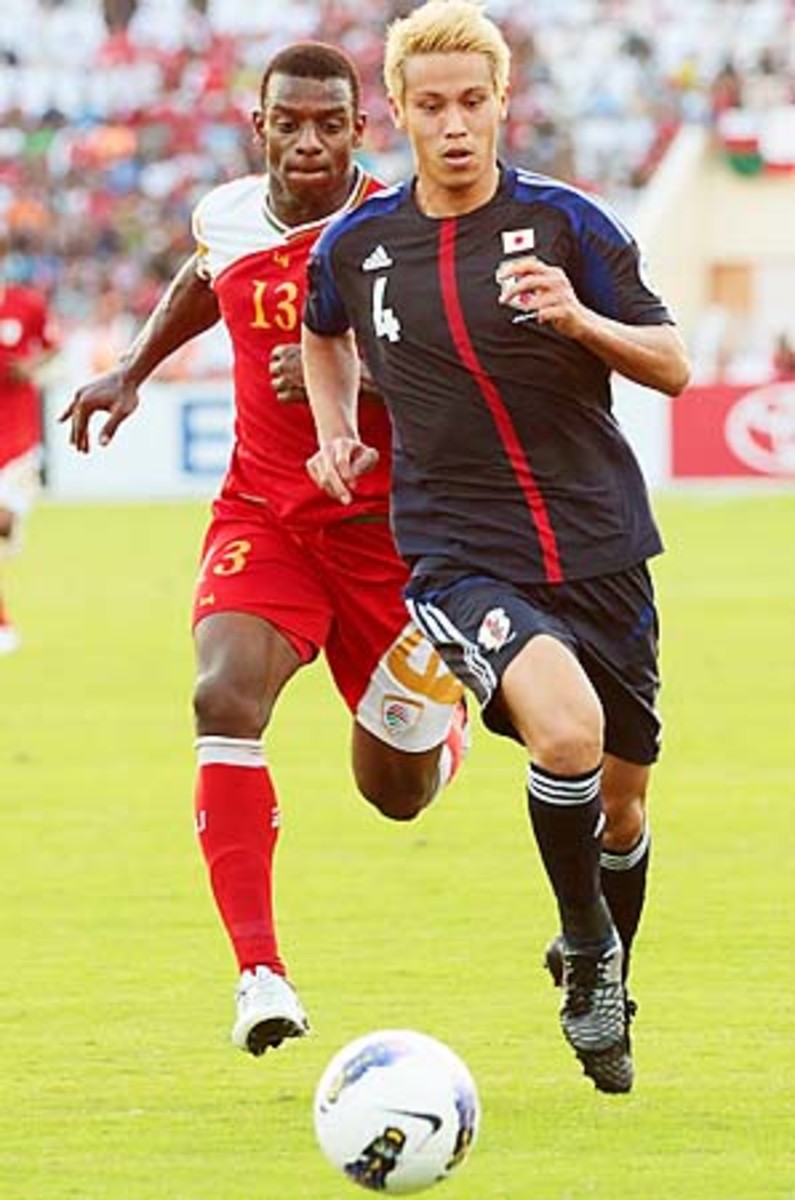Honda faces challenge as Japanese spotlight shifts to Kagawa
Keisuke Honda is still at the center of things for Japan on the field. He gets the coveted spot in the hole behind the striker while Shinji Kagawa remains on the left. It is a temporary frustration for Kagawa, the Manchester United man, before he returns to life at one of the biggest clubs in the world.
Kagawa is now the biggest Japanese soccer star in the world, though Honda has big club designs of his own. "Shinji's the perfect player for a world-class team," said Honda in the summer. "As a fellow Japanese I'm proud of him. But at the same time, as a rival, I'm aiming to play at a big club, too, and I think I'd fit in just as well."
Kagawa may get most of the attention from the media when he returns home for national team duty, but it would be a surprise if Honda did not think that he is the country's best player. It is just the way he is. Many fans certainly do, and the man who really matters, national team coach Alberto Zaccheroni, picks him ahead of Kagawa in Kagawa's best position. Yet the younger star is the one at Manchester United with Honda about to start a fourth year in Russia.
Perhaps the problem is one of perception. The standard of the Russian league, certainly among the top teams, is not in question, but Kagawa became one of the hottest properties in Europe after two seasons with Borussia Dortmund. Honda is taking a more roundabout route though his excellent showing at the 2010 World Cup and solid Champions League experience. He will have options as his contract enters its final year.
Perhaps a little friendly competition is exactly the kind of thing that Honda needs at this stage of his career as he considers his next destination. At the age of 26, and about to hit his peak, his next move will be a defining one.
The decision to head to Moscow in December 2009 in the face of supposed interest from all over Europe was unexpected. After almost two years in the Netherlands and 24 goals from midfield with VVV Venlo, big clubs all over Europe were linked with Honda. The then 23-year-old chose CSKA Moscow, which paid around $14 million. It seemed to be a smart move when, in March 2010, he scored the goal in Sevilla to take his new team to the last eight of the Champions League.
Just three months later, he was one of the stars of the World Cup with his free kick against Denmark, a thing of wonder especially as other players had struggled to master the Jabulani ball. According to Arsene Wenger, Honda was something special. "When they get the ball they can give it to Honda -- and the magic starts. When they get that genius Honda playing up front, he has shown what a top-class player he is. For me he's the best performer of the competition so far," said the Frenchman.
In 2010, both Arsenal and Manchester United inquired about Honda. But while European teams have often found signing Japanese talent from J-League clubs easy and cheap, doing business in Russia is often anything but.
The Italian club Lazio came the closest. In January 2012, it looked as if Honda was heading to Rome only for it to fall through at the last minute. In November CSKA President Yevgeny Giner explained why Honda remained in Russia.
"I'll tell you how it really was," Giner said. "Indeed, I had a conversation with Lazio and we discussed the price -- about 14-15 million Euros. Honda wanted to make his decision after knowing that how much the club can offer. Representatives of Lazio offered us six million Euros along with a mediocre player in exchange. However, it was way less than our asking price. They came again with an eight million Euros bid, but we told them to forget about the deal.
Honda did not seem too upset. "All I can say is that even if Lazio approached me, I wouldn't go," he said in August. "In the first half of the year I was 25, now I'm 26. A lot changes in half a year ... Initially I'd planned on showing off my skills at the World Cup and leaving Russia after half a year, but since then two years have passed."
If he sounds frustrated, then so are fans in Japan who want to see him in the big leagues. The question is which one. He has mentioned a desire to play in Spain in the past. In England, Liverpool and Arsenal are routinely mentioned while reports out of Russia suggested that if, instead of Lazio, it had been Juventus or one of the Milan clubs doing the negotiating, Honda would have been much more interested.
The truth is, nobody knows what he will do and where he will go. Honda is just as capable of doing something unexpected off the field as he is on it. He is not your normal soccer player.
After Japan lost 4-0 to Brazil in October, among the usual platitudes offered up by the beaten team, Honda said this: "I usually play in Russia, and I must say I haven't enjoyed myself like this for a long time. It won't be interesting any longer if we [Japan] beat them [Brazil] easily."
Honda likes a challenge. Choosing the right club will be one of his biggest.






